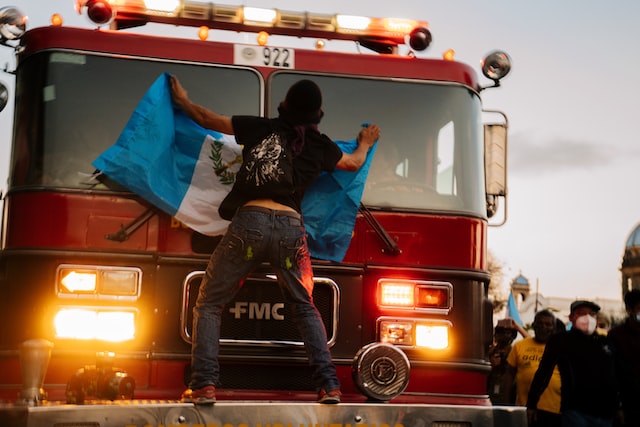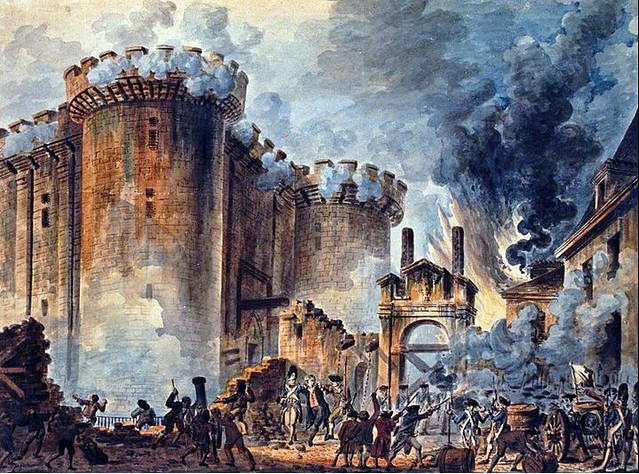Rebellion is an act of defiance against an authority figure. It can be violent or non-violent, but it typically does not aim to completely overthrow the existing government. Revolution, on the other hand, is a complete overthrow of the existing government. It is usually much more organized than a rebellion, and it has a clear goal of completely replacing the old government with a new one.
Rebellion is typically more about defiance and making a statement, while revolution is about actually overthrowing the government. Revolution is usually much more planned out and organized than rebellion, and it has a clear goal of establishing a new government.
What is rebellion?
(Photo by Shalom de León on Unsplash )

There are many ways to rebel. You can rebel against authority, societal norms, or your own personal demons. But what is rebellion, really?
At its core, rebellion is about standing up for what you believe in, even if that means going against the grain. It’s about refusing to accept things as they are and instead striving for something better. It’s a statement that says, “I’m not going to take this anymore.”
Rebellion can be a powerful force for good. It can embolden people to stand up against injustice and fight for what’s right. It can also lead to positive change on a personal level, helping people to break free from self-destructive habits or toxic relationships.
Of course, rebellion can also be destructive. When it’s driven by anger and hatred, it can lead to violence and destruction. And when it’s motivated by selfishness and greed, it can result in corruption and chaos.
Understanding Rebellion
Rebellion can be defined as an organized uprising against an established government or political system. It is a form of resistance against the authority and is usually sparked by grievances and dissatisfaction with the current state of affairs. Rebellions can take many forms, including armed insurrections, mass protests, and acts of civil disobedience.
Rebellions often have limited goals and do not aim to fundamentally alter the existing political structure. Instead, they seek to address specific grievances and bring about change within the existing framework. For example, a rebellion may aim to secure greater political representation for a marginalized group, end a particular policy, or win more rights and freedoms for the people.
What is revolution?
(Photo By tonynetone on Flickr)

A revolution, by definition, is “a sudden, complete, or marked change in something.” In other words, it is a fundamental change that upends the status quo. A rebellion, on the other hand, is a “revolt against authority.” It is a uprising against those in power. While a revolution seek to entirely overhaul the system, a rebellion simply wants to overthrow those in charge.
The difference between rebellion and revolution
The main difference between rebellion and revolution is that rebellion is an uprising against authority, while revolution is a complete overthrow of the existing power structure. A revolution typically results in a change in government, while a rebellion may or may not.
The key differences between rebellion and revolution
Goals: The primary objective of a rebellion is to address specific grievances and bring about change within the existing framework, while the goal of a revolution is to fundamentally alter the existing political, social, and economic systems of a society.
Scale: Rebellions are typically localized and have limited scope, while revolutions are characterized by widespread social and political upheaval and the collapse of existing institutions.
Degree of Change: Rebellions aim to bring about limited change, while revolutions aim to bring about comprehensive and radical change.
Violence: While rebellions may involve violence, it is not always the case. Revolutions, on the other hand, are typically characterized by violence and the use of force to overthrow the existing order.
Legacy: The legacy of a rebellion is often limited and short-lived, while the legacy of a revolution is far-reaching and long-lasting, shaping the course of history for generations to come.
The Impact of Rebellion and Revolution
Rebellions and revolutions can have far-reaching and long-lasting impacts on the societies they affect. They can bring about significant political, social, and economic change and shape the course of history for generations to come.
For example, the American Revolution had a profound impact on the political and economic systems of the United States, leading to the establishment of a democratic system of government and a market-based economy. Similarly, the French Revolution had a lasting impact on the political, social, and economic systems of France, and its legacy continues to shape the course of European history to this day.
What are the possible outcomes of a rebellion?
When a group of people rebel, they are typically trying to overthrow an existing government or leader. A revolution, on the other hand, generally results in a complete change in the way a society is run. The aim of a rebellion may be to make some kind of change within the existing system, while the goal of a revolution is often to completely replace it.
There are many possible outcomes of a rebellion. It could result in minor changes to the government or leader that was targeted, or it could lead to their complete overthrow. In some cases, a rebellion may simply fizzle out without accomplishing anything. And sometimes, a successful rebellion can trigger a larger revolution that brings about significant changes to the entire society.
What are the reason for rebellions?
There are many reasons why people may start a rebellion. Some common reasons include:
- Feeling like they have been oppressed or treated unfairly
- Wanting to improve their living conditions or those of others
- Opposing a ruler or government they believe is corrupt or unjust
- Seeking independence for themselves or their group
Rebellions can be motivated by a desire for social change, revenge, or simply the opportunity to loot and pillage. Sometimes, people rebel against a specific policy or set of policies, while other times they may rebel against an authority figure or system in general.
What are the possible outcomes of a revolution?
The outcomes of a revolution can vary and are often shaped by a number of factors, including the nature and goals of the revolution, the resources and strength of the revolutionary forces, the response of the established government and counter-revolutionary forces, and the support of the broader population. Some possible outcomes of a revolution include: the establishment of a new political system and government, significant reforms to existing institutions, the transfer of power to a different social or political group, increased civil liberties and political freedoms, and in some cases, the escalation of violence and instability. However, the outcomes of a revolution can also be negative, such as: the rise of a new oppressive regime, increased violence and conflict, economic instability, and the erosion of civil liberties.
What are the reason for revolution?
The word ‘revolution’ is derived from the Latin word “revolutio”, which means ‘a turn around’. A revolution is a sudden and drastic change in the way a society is organized, usually with violent overthrow of the existing government. The causes of revolutions vary, but they are often the result of long-standing grievances against the ruling authorities, such as unjust taxes, corruption, or tyranny. Sometimes, a natural disaster or economic crisis can be the trigger for a revolution.
What are the types of revolutions?
There are three types of revolutions: Violent, Nonviolent, and Velvet.
A violent revolution is one in which the people overthrow the government through force. This can be done through armed conflict or other forms of violence, such as assassination.
A nonviolent revolution is one in which the people overthrow the government without resorting to violence. This type of revolution is often successful when the people are able to mount a massive campaign of civil disobedience that the government cannot quell.
A velvet revolution is a bloodless revolution in which the government is overthrown through a combination of mass protests and pressure from within the ruling party.
What are the types of rebellions?
Rebellions can take on many different forms, and can be categorized based on various factors such as their causes, goals, and tactics. Some common types of rebellions include:
- Political rebellions: uprising against the government or political system, with the goal of bringing about political change.
- Nationalistic rebellions: rebellions aimed at achieving independence or greater autonomy for a particular nation or people.
- Religious rebellions: uprising against a dominant religious authority or establishment, often with the goal of establishing a new religious order or regime.
- Social rebellions: rebellions arising from grievances or injustices experienced by a particular social group, aimed at bringing about social and economic changes.
- Peasant rebellions: rebellions by rural populations, often against landed elites or the state, in response to economic hardships and political oppression.
- Armed rebellions: rebellions that employ military force or violence as a means of achieving their goals.
These are just some examples of the many different forms that rebellions can take. The specific characteristics of a rebellion will depend on a wide range of historical, political, and social factors.
What are some major rebellions in history?
There have been many rebellions throughout history, and it is impossible to list all of them. However, some of the most significant and well-known rebellions include:
- The American Revolution (1775-1783): the 13 American colonies’ successful rebellion against British rule, leading to the establishment of the United States of America.
- The Haitian Revolution (1791-1804): a slave revolt in the French colony of Saint-Domingue, leading to the establishment of Haiti as the first independent black republic in the world.
- The Irish Easter Rising (1916): a rebellion against British rule in Ireland, which helped to establish the Irish Free State and lay the groundwork for the eventual creation of the Republic of Ireland.
- The Indian Rebellion of 1857: also known as the “First War of Indian Independence,” a widespread uprising against British rule in India, which marked a turning point in India’s struggle for independence.
- The Boxer Rebellion (1899-1901): an anti-foreign and anti-Christian uprising in China, aimed at ending foreign influence and presence in China.
- The Arab Spring (2010-2012): a series of popular uprisings in the Arab world, marked by widespread protests and civil unrest, aimed at ending authoritarianism and promoting greater political and economic freedom.
These are just a few examples of the many rebellions that have taken place throughout history. Each rebellion has its own unique context and set of causes, and has played a role in shaping the course of world history.
Featured Image By – Photo by Markus Spiske on Unsplash








